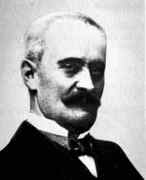Person: Farkas, Gyula

Gyula Farkas was a Hungarian mathematician and physicist who worked on linear programming and linear inequalities.
Mathematical Profile (Excerpt):
- After completing his schooling by the Benedictines, Farkas went to Pest with the intention of studying law and music.
- However, the Compromise led to raising standards of education in mathematics and the sciences and Farkas would play his part in bringing the country up to international levels.
- Farkas worked as a private tutor for a while before returning to university to study physics and chemistry.
- Farkas was also given the opportunity to make visits abroad to broaden his background in mathematics and physics.
- By 1880 Farkas had an impressive publication record in Comptes Rendus and was appointed as a dozent in function theory at the university in Pest.
- Readers may have noted that we have given 27 December as the day of Farkas's death, rather than 26 December given by Filep in the quotation above.
- He is remembered for Farkas theorem which is used in linear programming and also for his work on linear inequalities.
- In 1881 Gyula Farkas published a paper on Farkas Bolyai's iterative solution to the trinomial equation, making a careful study of the convergence of the algorithm.
- In a paper published three years later, Farkas examined the convergence of more general iterative methods.
- Not only did Farkas serve the University of Kolozsvár as a professor, but he also served as Dean and as Rector of the University.
Born 28 March 1847, Sárosd, Fejér County, Hungary. Died 27 December 1930, Pestszentlorinc, Hungary.
View full biography at MacTutor
Tags relevant for this person:
Origin Hungary
Thank you to the contributors under CC BY-SA 4.0! 

- Github:
-

- non-Github:
- @J-J-O'Connor
- @E-F-Robertson
References
Adapted from other CC BY-SA 4.0 Sources:
- O’Connor, John J; Robertson, Edmund F: MacTutor History of Mathematics Archive
